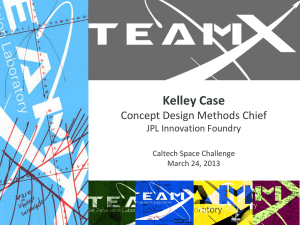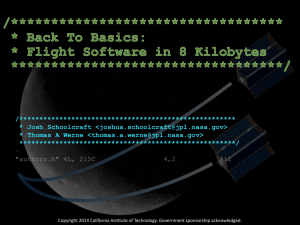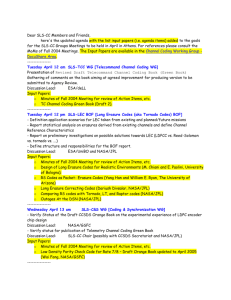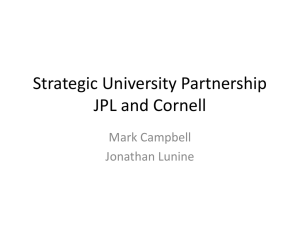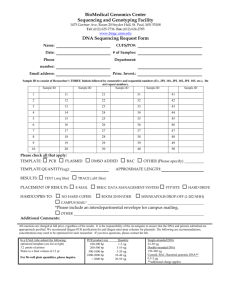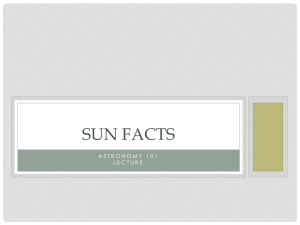ppt - California Institute of Technology
advertisement
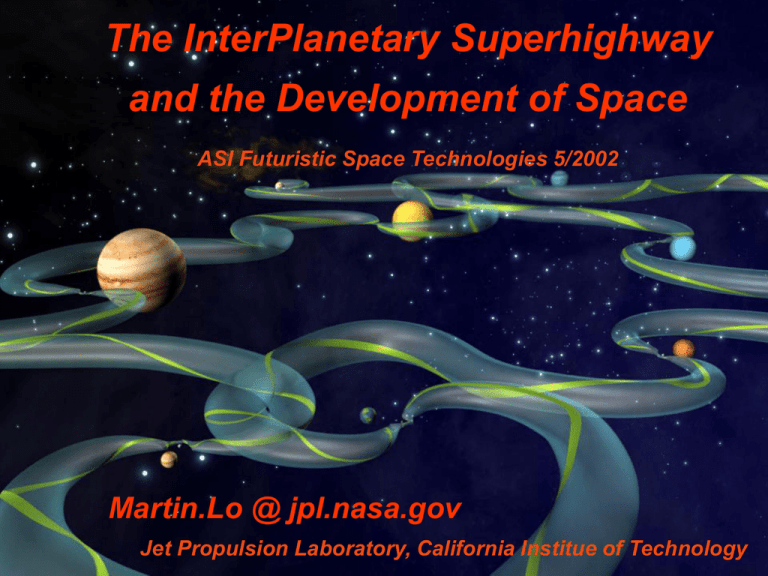
The InterPlanetary Superhighway
and the Development of Space
ASI Futuristic Space Technologies 5/2002
Martin.Lo @ jpl.nasa.gov
Jet Propulsion Laboratory, California Institue of Technology
JPL
The InterPlanetary Superhighway
Martin.Lo@jpl.nasa.gov
Trajectory Is a Key Space Technology
• Golden Age of Trajectory Technology Just Around Corner
• Trajectory Is a Mission-Enabling, Intellectual Technology
– Not All Technology Is Hardware!
• Space H/W Technology and Trajectory MUST Develop
Side by Side
– Like “Rail Road Tracks” for the Train
– Example: Ion Engines Have Been Around a Long Time, Their Use
Have Been Limited by the Lack of ‘Low Thrust’ Trajectory Design
Tools
MWL - 2
JPL
The InterPlanetary Superhighway
Martin.Lo@jpl.nasa.gov
Outline
• The InterPlanetary Superhighway (IPS)
• A New Paradigm for the Solar System
• Low Energy Orbits for Space Missions
MWL - 3
JPL
The InterPlanetary Superhighway
How It All Began: ISEE3/ICE
Martin.Lo@jpl.nasa.gov
LOGO.049
Goddard Space Flight Center
GSFC: FARQUHAR, Dunham, Folta, et al
Courtesy of D. Folta, GSFC
MWL - 4
JPL
The InterPlanetary Superhighway
Martin.Lo@jpl.nasa.gov
LOGO.049
Current Libration Missions
Goddard Space Flight Center
•z
WIND
MAP
SOHO
GENESIS
ACE
NGST
Courtesy of D. Folta, GSFC
MWL - 5
JPL
The InterPlanetary Superhighway
Martin.Lo@jpl.nasa.gov
Lagrange Points in Earth’s Neighborhood
• Every 3 Body System Has 5 Fixed Points Called Lagrange Points
– Earth-Moon-S/C: LL1, LL2, … LL5
– Sun-Earth-S/C:
EL1, EL2, …
• They Generate the InterPlanetary Superhighway
MWL - 6
JPL
The InterPlanetary Superhighway
Martin.Lo@jpl.nasa.gov
Orbital Zoology Near the Lagrange Points
X
S: Sun Region
S
J
J: Jupiter Region
X: Exterior Region
(Outside Jupiter’s Orbit)
•
•
•
•
•
Four Families of Orbits, Conley [1968], McGehee [1969], Ref. Paper
Periodic Orbit (Planar Lyapunov)
Spiral Asymptotic Orbit (Stable Manifold Pictured)
Transit Orbits (MUST PASS THRU LYAPUNOV ORBIT)
Non-Transit Orbits (May Transit After Several Revolutions)
MWL - 7
JPL
The InterPlanetary Superhighway
Martin.Lo@jpl.nasa.gov
Generated by Stable & Unstable Manifolds of
Unstable Libration Orbits
• Unstable Periodic Orbits
– Generate the Tubes
– Portals to the Tubes
• The Tubes Govern Transport
Planet
– Transport Must Occur Thru Tubes
– Systematically Map Out Orbit Space
• Green Tube = Stable Manifold:
Orbits Approach the L1 Periodic
Orbit, No DV Needed
• Red Tube = Unstable Manifold:
Orbits Leave the L1 Periodic Orbit
MWL
- 8
MWL
- 11
JPL
The InterPlanetary Superhighway
Martin.Lo@jpl.nasa.gov
Halo Orbit Transfer and Insertion Via
The InterPlanetary Superhighway
MWL - 9
Genesis Mission: Uses L1, L2 Heteroclinic Behavior
to Collect & Return Solar Wind Samples to Earth
UTTR 84 x 30 km
JPL
The InterPlanetary Superhighway
Martin.Lo@jpl.nasa.gov
Nominal Trajectory NO Deterministic DV!
View from N. Ecliptic (Z-axis)
1
Y
0.5
8
9
To
Sun
6
1, 15, 16
4
14
2
3
7
12
halo
orbit
-0.5
11
lunar
orbit
5
0
1
2
3
4
5
6
7
8
9
10
11
12
13
14
15
16
X
13
10
parking
orbit (option)
Launch
TCM-1
TCM-2
TCM-3
TCM-4
Halo Orbit Insertion (TCM-5)
Begin Science Phase
End Science Phase
Halo Orbit Departure (TCM-6)
TCM-7
TCM-8
TCM-9
TCM-10
TCM-11
Entry
Backup Entry
-1
-2
-1.5
-1
-0.5
0
0.5
1
1.5
2
0.5
L+30d
Transfer
Return
Recovery
01/07/01
01/07/01
01/14/01
01/21/01
04/13/01
04/23/01
04/30/01
03/22/03
04/01/03
04/15/03
06/10/03
07/20/03
08/09/03
08/18/03
08/19/03
09/07/03
Science
0.5
Z
4
3
2
1
10
14
To
Sun
8
76 5
0
11
9
10
X
13
13
12
-0.5
4
32
1
14
7 6
12
11
9
8
5
-0.5
-2
-1.5
-1
-0.5
0
View from Anti-Earth Velocity (-Y-axis)
0.5
1
1.5
2
Axis, in millions of kilometers:
X = Sun-Earth Line, positive anti-sun
Y = (Z) x (X)
Z = Ecliptic Normal
-1
-0.5
0
0.5
1
View from Anti-Sun (X-axis)
MWL - 11
JPL
The InterPlanetary Superhighway
Martin.Lo@jpl.nasa.gov
Genesis Mission Design Collaboration
Martin Lo
JPL
Genesis Mission Design Manager
Kathleen Howell
Purdue University
Department of Aeronautics and Astronautics
Brian Barden
Roby Wilson
JPL, Purdue University
JPL, Purdue University
MWL - 12
Pioneer Work:
Numerical Exploration by Hand
JPL Lagrange Group
New Paradigm:
Dynamical Systems Automation
Lunar Orbit
L1
Earth
L2
Halo Orbit
Portal
JPL Lagrange Group
JPL
The InterPlanetary Superhighway
Martin.Lo@jpl.nasa.gov
Why Dynamical Systems Theory?
• Traditional Approach
–
–
–
–
Requires First Hand Numerical Knowledge of Phase Space
Each Trajectory Must Be Computed Manually (VERY SLOW)
Cannot Perform Extensive Parametric Study or Montecarlo Simulation
Optimization Difficult, Nearly Impossible
• Dynamical Systems Theory Provides
–
–
–
–
S/W Automatic Generation of Trajectories
S/W Automatically Maps Out Phase Space Structures
Near Optimum Trajectory
Automatable Parametric Studies & Montecarlo Simulations
Genesis
Return
Earth
L1
L2
Halo Orbit
ISEE3/ICE Orbit
Genesis Unstable Manifold
MWL - 15
JPL
The InterPlanetary Superhighway
Martin.Lo@jpl.nasa.gov
LTool Reduced Genesis End-to-End Orbit Design
from 8-12 Weeks to 1 Day
Trade Parameters
Total Cost (Millions of Dollars)
LTool Funding Level Options
0
1.72 M
2.3 M
Genesis Critical
3.4 M
Multi-Mission
Critical
0
1M
2.3 M
3.4 M
0
0.72 M (4 WY)
0
0
50%
75%
100%
100%
8-12 Weeks
1-2 Week
1 Day
1 Day
Tool Cost
Increase Funding to Genesis Mission
Design Workforce
Genesis Operational Tool at JPL
(% at JPL)
Genesis Mission Design Update
Turnaround Time
Genesis Nominal Mission Design Work
(% Planned Work Accomplished)
Genesis Contingency Analysis Work
Genesis Contingency Analysis
Capability
Genesis Mission Design Risk
25%
100%
100%
100%
Current Genesis Mission Design Budget Plan Includes Only Contingency Analysis for
Launch Error (< 3
Some < 3
<3
>3
>3
High Risk
Medium Risk
Low Risk
Low Risk
None
Very Limited
Limited
General
None
None
None
Yes
Multimission Support
Advanced Mission Support
Infrastructure
High Complexity:
Low Complexity:
Very Limited:
Tool use requires extensive training, process is time-consuming and error-prone.
Tool enables users to work at higher level, reduces time, error, and complexity.
Provides infrastructure and tools adaptable for future missions with additional funding
MWL - 16
JPL
The InterPlanetary Superhighway
Martin.Lo@jpl.nasa.gov
LTool Supported Genesis Launch Delay
•
•
•
•
Genesis Launch Delayed from 2/01 to 8/01
LTool Enabled Designers to Replan Genesis Mission in 1 Week
Without LTool, Genesis Would Require Costly Additional Delay
LTool and Dynamical Systems Contributed Significantly to Genesis’
Successful Launch on 8/8/2001.
Genesis
Return
Earth
L1
L2
Halo Orbit
ISEE3/ICE Orbit
Genesis Unstable Manifold
MWL - 17
JPL
The InterPlanetary Superhighway
Martin.Lo@jpl.nasa.gov
JPL LTool Team
Martin Lo
Section 312
Task Manager
Dr. Larry Romans
Section 335
Cognizant S/W Engineer (Marthematica Developer)
Dr. George Hockney
Section 367
S/W Architecture & Sys Engineer
Dr. Brian Barden
Section 312
Trajectory Design & Algorithms
Min-Kun Chung
Section 312
Astrodynamics Tools
James Evans
Section 368
Infrastructure S/W, Visualization Tools
MWL - 18
InterPlanetary Superhighway:
Many Different Types of Orbital Motions
Earth Flyby &
Capture
Hiten Lunar
Capture
Lunar Orbit
L1
Earth
Genesis
Earth Return
Via L2
L2
Halo Orbit
Portal
Lunar Flyby
Escape to
SIRTF Earth
Trailer Orbits
JPL Lagrange Group
JPL
The InterPlanetary Superhighway
Martin.Lo@jpl.nasa.gov
Tunneling Through Phase Space Via IPS
• Cross Section of Tube Intersection Partitions Global Behavior
– Yellow Region Tunnels Through from X Through J to S Regions
– Green Circle: J to S Region, Red Circle: X to J Region
– Genesis-Type Trajectory Between L2 and L1 Halo Orbits (Heteroclinic)
MWL - 20
JPL
The InterPlanetary Superhighway
Martin.Lo@jpl.nasa.gov
Construction of Rapid Transition
• Manifold Intersections Computed Via Poincare Sections
• Reduce Dimension by 1, Tube Becomes Circle
• Intersections Provide Transit Orbits from L2 to L1
MWL - 21
JPL
The InterPlanetary Superhighway
Martin.Lo@jpl.nasa.gov
Construction of Capture Orbits
• Manifold Intersections Computed Via Poincare Sections
• Reduce Dimension by 1, Tube Becomes Circle
MWL - 22
JPL
The InterPlanetary Superhighway
Martin.Lo@jpl.nasa.gov
Construction of Heteroclinic Orbits
• Manifold Intersections Computed Via Poincare Sections
• Reduce Dimension by 1, Tube Becomes Circle
– Green Circle Leaves J to S Region
– Red Circle Enters J from X Region
• Intersections Provide Transit Orbits from L2 to L1
MWL - 23
JPL
The InterPlanetary Superhighway
Martin.Lo@jpl.nasa.gov
Heteroclinic-Homoclinic Chain
in Jupiter’s InterPlanetary Superhighway
• 2:3 to 3:2 Resonance Transport, No Energy Transfer Needed
• Source of Chaotic Motion in the Solar System
2:3
Resonance
Hilda 3:2
Resonance
MWL - 24
JPL
The InterPlanetary Superhighway
Martin.Lo@jpl.nasa.gov
Genesis’ Homoclinic-Heteroclinic Chain
• Genesis Shadows Heteroclinic Cycle, Moon Plays Role (Bell et al.)
• SIRTF, SIM-Type Heliocentric Orbits Related to Homoclinic Orbits
MWL - 25
JPL
The InterPlanetary Superhighway
Martin.Lo@jpl.nasa.gov
Theorem to Temporary Capture by Design
• The Existence of Homoclinic and Heteroclinic Cycles Implies We
Can Choose An Infinite Sequence of Integers, Doubly Indexed,
N(i ,j) , i = Sun, L1, Jupiter, L2, Xsun; j = 1, 2, 3, …
N(i ,j) = Number of Revolutions Around Body(I), Called an ITINERARY
• THEOREM: There Exist an Orbit Which Realizes N(i ,j).
•
•
Based on Conley-Moser’s Theorem on Symbolic Dynamics
Voila! TEMPORARY CAPTURE BY DESIGN
Xsun
N5
Sun
L1
Jupiter
L2
N1
N2
N3
N4
MWL - 26
JPL
The InterPlanetary Superhighway
Martin.Lo@jpl.nasa.gov
Orbit with Itinerary (X,J;S,J,X)
• Using Symbolic Dynamics Technique to Realize Complex Itinerary
• Capture Around Jupiter Multiple Revolutions (Specifiable)
• Note (2:3) to (3:2) Resonance Transition
MWL - 27
JPL
The InterPlanetary Superhighway
Martin.Lo@jpl.nasa.gov
Foundation Dynamics Work
Wang Sang Koon
Martin Lo
Jerrold Marsden
Caltech
JPL, Principal Investigator
Caltech
Control and Dynamical Systems Department
Shane Ross
Caltech
MWL - 28
JPL
The InterPlanetary Superhighway Martin.Lo@jpl.nasa.gov
New
Old Paradigm
Paradigm of
of the
the Solar
Solar System
System
InterPlanetary
Copernican Model:
Superhighway
Isolated Conic
Connects
Orbits
All
MWL - 29
JPL
The InterPlanetary Superhighway
Martin.Lo@jpl.nasa.gov
IPS a New Pardigm of the Solar System
• InterPlanetary Superhighway Connects Entire Solar System
– Instead of Planets In Isolated Separate Conic Orbits
– Solar System Is An Organic and Integrated Whole Where Each Part Is
Communicating with One Another
– Governs Transport and Morphology of Materials
• Shape Morphology of Rings and Belts
• Contributes to Theory of Motions of Comets, Asteroids, Dust
• Governs Planetary Impacts from Asteroids and Comets
– ShoemakerLevy9 Follwed Jupiter IPS to Final Impacts
– Genesis Trajectory Is an Impact Trajectory
– 1% of Near Earth Objects In Energy Regime of Genesis Trajectory,
Considered Most Danerous
• This Theory Contributes to Understanding of our Origins
MWL - 30
JPL
The InterPlanetary Superhighway
Martin.Lo@jpl.nasa.gov
Examples from Nature: Comet Oterma
• Theme: Use Natural
Dynamics to Optimize DV for
Space Missions:
– Genesis 6 m/s Det. DV
• Jupiter Family Comets
• (2:3) to (3:2) Free
Resonance Transition
• Temporary Capture
• L1, L2 as Gate Keeper
• What Is Source of Chaotic
Dynamics?
MWL - 31
JPL
The InterPlanetary Superhighway
Martin.Lo@jpl.nasa.gov
L1, L2 Manifolds and Comet Orbits
• L1, L2 Manifolds Have
(2:3) to (3:2) Resonance
Transitions
• Manifolds Match
Oterma’s Orbit Well
• Also Matches Gehrels3
Orbits
– Temporary Capture
– Near Halo Orbit
• L1, L2 Manifolds Are
DNA of This Dynamics
• Need to Study Invariant
Manifold Sturcture
MWL - 32
JPL
The InterPlanetary Superhighway
Martin.Lo@jpl.nasa.gov
Comet Oterma Shadows
Jupiter’s Heteroclinic-Homoclinic Cycles
MWL - 33
JPL
The InterPlanetary Superhighway Martin.Lo@jpl.nasa.gov
Mapping the Orbit Space
Using Poincare Sections
.
Orbits
.
Poincare Map
.
MWL - 34
JPL
The InterPlanetary Superhighway
Martin.Lo@jpl.nasa.gov
Poincare Section of Jupiter’s IPS
2:1
Kirkwood
Gap
2.1 AU
3:2
Hilda
Asteroid
Group
4AU
MWL - 35
JPL
The InterPlanetary Superhighway
Martin.Lo@jpl.nasa.gov
Asteroid Belt Stucture Induced by IPS
• Poincare Section from Single
Orbit Leaving Jupiter L1
– Each Dot Is a Rev Around the Sun
2:1
3:2
Mars
Crosser
Stable
– Spirals Towards Inner Solar
System
– Eccentricity Grows
• Indistiguishable from Ordinary
Conic Orbits
ECC = .5
2.1 AU
4 AU
• Controls Asteroid Belt Structures
• Controls Dust Transport and
Morphology
• Intimate Connection with Low
Thrust Trajectory Design
ECC = .05
Semi-Major Axis
MWL - 36
JPL
The InterPlanetary Superhighway
Martin.Lo@jpl.nasa.gov
IPS ExoZodi Dust Signatures for Planet Detection
• Earth’s Zodi Dust Ring Simulated WIth Lagrange Point Dynamics
– Only Gravity, No PR Drag
• S: Sun Region, Earth: Planet Region, X: Exterior Region
• May Provide Planetary Signatures for Exo-Planet Detection
X
S
EARTH
MWL - 37
JPL
The InterPlanetary Superhighway
Martin.Lo@jpl.nasa.gov
IPS and Transport in the Solar System
Poincare Section of the InterPlanetary Superhighway
Legend
L1 IPS Orbits
L2 IPS Orbits
Comets
Asteroids
Kuiper Belt
Object
MWL - 38
JPL
The InterPlanetary Superhighway
Martin.Lo@jpl.nasa.gov
Discovery of InterPlanetary Superhighway
Martin Lo
JPL
Genesis Mission Design Manager
Shane Ross
Caltech
Control and Dynamical Systems
MWL - 39
JPL
The InterPlanetary Superhighway
Martin.Lo@jpl.nasa.gov
Around the Solar System in 80K Days
Kuiper Belt Object (KBO)
• FREE Spiral Orbit
Transfer of KBO to
Asteroid Belt Produced
by LTool Using IPS
Jupiter
– Origin of Jupiter Comets
– Replenish Asteroid Belt
– Escape from Solar System
Saturn
~Uranus (fictitious mass)
~Neptune (fictitious mass)
• Less Than 1 Pluto Year
• Scales for Jupiter and
Saturn Satellite Systems
• Suggests New Low
Thrust Algorithm
MWL - 40
JPL
The InterPlanetary Superhighway
Martin.Lo@jpl.nasa.gov
From AU to au: Comets & Atomic Physics
• Uncanny Similarity of Transport Theory
Atomic Halo Orbit
•
Nucleus
in 3 Body Problem
• Rydberg Atom In Cross Fields
• Chemical Transition State Theory
Atomic L1
•
Jupiter
•
Jupiter
Comet L1 , L2
Atomic Potential
Energy Surface
Comet’s Potential
Energy Surface
MWL - 41
JPL
The InterPlanetary Superhighway
Martin.Lo@jpl.nasa.gov
Mars Meteorite
• Build Instruments & S/C Lunar L1 Station
• Transfer S/C from L1 to Earth-L2 LIO (Libration Oribit)
• Service S/C at Earth L2 LIO from Lunar L1 Gateway Hub
MWL - 42
JPL
The InterPlanetary Superhighway
Martin.Lo@jpl.nasa.gov
Asteroid Transport Rate Near Mars*
Charles Jaffe
Shane Ross
David Farelly
Martin Lo
Jerrold Marsden
Turgay Uzer
West Virgina University
Caltech
Utah State University
JPL
Caltech
Georgia Tech
* To appear in “Physical Review Letters” (7/1/02)
MWL - 43
JPL
The InterPlanetary Superhighway
Martin.Lo@jpl.nasa.gov
SL9 Impact Via Jovian IPS
MWL - 44
JPL
The InterPlanetary Superhighway
Martin.Lo@jpl.nasa.gov
River of Life: Astrobiology
MWL - 45
JPL
The InterPlanetary Superhighway
Martin.Lo@jpl.nasa.gov
1% Near Earth Objects Have IPS Energies
Armageddon Or Opportunity?
MWL - 46
JPL
The InterPlanetary Superhighway
Martin.Lo@jpl.nasa.gov
IPS and Development of Life: Exobiology
• InterPlanetary Superhighway Brought Life Building Material from
Comets and Asteroids to Earth
• InetrPlanetary Superhighway May Have Brought the Asteroid Killing
the Dinosaurs Via a Genesis-Like Orbit
– Presence of Abundant Iridium Implies Slow Impact Velocity
– Conjectured by Mike Mueller et al (Nemesis Star)
• InterPlnaetary Superhighway Theory Can Provide Critical Transport
Rates for Astrobiology
– How Rates Determine Formation of Life on a Planet
– Can Rates Be Obtained from ExoZodi Signatures to Find Potential Life
Bearing ExoPlanets?
MWL - 47
JPL
The InterPlanetary Superhighway
Martin.Lo@jpl.nasa.gov
RESCUE MISSION 911:
Hiten, HAC
Discover, June 1999
MWL - 48
JPL
The InterPlanetary Superhighway Martin.Lo@jpl.nasa.gov
Dynamics of Hiten Lunar Capture Orbits
MWL - 49
JPL
The InterPlanetary Superhighway
Martin.Lo@jpl.nasa.gov
Designing a Lunar Capture Orbit
A CROSS SECTION OF THE SUN-EARTH AND EARTH-MOON IPS
PARTITIONS THE ORBITAL DESIGN SPACE INTO CLASSES
TRAJECTORIES FROM
SUN-EARTH EXTERIOR
REGION
CONTAINS ALL
EARTH TO LUNAR
CAPTURE ORBITS
ON ENERGY
SUFACE
TO EARTH-MOON
INTERIOR REGION
TRAJECTORIES
FROM SUN-EARTH
INTERIOR
REGION
MWL - 50
JPL
The InterPlanetary Superhighway
Martin.Lo@jpl.nasa.gov
Construction of Capture Orbits
Moon
• Manifold Intersections Computed Via Poincare Sections
• Reduce Dimension by 1, Tube Becomes Circle
MWL - 51
JPL
The InterPlanetary Superhighway Martin.Lo@jpl.nasa.gov
Hiten-Like Low Energy Transfer & Ballistic Lunar Capture
Shoot the Moon
36 m/s Maneuver to
Transfer to Stable
Manifold of Moon L2
Lyapunov Orbit
Shoot the Moon
Lunar Orbit
Shadowing Stable
Manifold of Earth L2
Lyapunov Orbit to
Leave Earth
Earth
Ballistic Lunar Capture
Shadowing Unstable Manifold of Earth
L2 Lyapunov Orbit
MWL - 52- 1
MWL
JPL
The InterPlanetary Superhighway
Martin.Lo@jpl.nasa.gov
Shoot the Moon: Lunar Capture
Wang Sang Koon
Martin Lo
Jerrold Marsden
Caltech
JPL, Principal Investigator
Caltech
Control and Dynamical Systems Department
Shane Ross
Caltech
MWL - 53
JPL
The InterPlanetary Superhighway
Martin.Lo@jpl.nasa.gov
TPF in Formation Flight Near L2
To
Sun &
Earth
L2
TPF Formation
MWL - 54
JPL
The InterPlanetary Superhighway
Martin.Lo@jpl.nasa.gov
TPF in SIRTF/SIM-Like Heliocentric Orbit
TPF Formation
MWL - 55
JPL
The InterPlanetary Superhighway
Martin.Lo@jpl.nasa.gov
First Formation Flight Design Around L2
For the Terrestrial Planet Finder Mission (TPF)
Min Kun Chung
Gerard Gomez
Martin Lo
Josep Masdemont
Ken Museth
Larry Romans
JPL
Barcelona University
JPL, TPF Mission Design Lead
Polytechnic University of Catalunya
Caltech Computer Graphics Group
JPL
MWL - 56
JPL
The InterPlanetary Superhighway
Martin.Lo@jpl.nasa.gov
Problem:
Human Service to Libration Missions
• ISSUE: 3 Months Transfers to EL2 Too Long for Humans
• Short Transfers Too Difficult
• Infrastructure Too Expensive
TPF
@Earth L2
STA-103 astronauts replaced gyros needed for
orientation of the Hubble Space Telescope.
JSC
MWL - 57
JPL
The InterPlanetary Superhighway
Martin.Lo@jpl.nasa.gov
Solution:
Human Servicing at Lunar L1 Gatewy
• Build Instruments & S/C Lunar L1 Gateway for EL2
• Service S/C at Earth L2 from Lunar L1 Gateway Module
LUNAR L1
GATEWAY
EARTH L2
HALO ORBIT
MOON
LUNAR L1
HALO ORBIT
LUNAR L2
HALO ORBIT
EARTH
MWL - 58
JPL
The InterPlanetary Superhighway
Martin.Lo@jpl.nasa.gov
Lunar L1 to Earth L2 Transfer
• Build Instruments & S/C Lunar L1 Station
• Transfer S/C from L1 to Earth-L2 LIO (Libration Oribit)
• Service S/C at Earth L2 LIO from Lunar L1 Gateway Hub
.
Lunar L1
.
.
Lunar L2
Earth
L2
Lunar Rotating Frame
Earth Rotating Frame
MWL - 59
JPL
The InterPlanetary Superhighway
Martin.Lo@jpl.nasa.gov
MWL - 60
JPL
The InterPlanetary Superhighway
Martin.Lo@jpl.nasa.gov
MWL - 61
JPL
The InterPlanetary Superhighway
Martin.Lo@jpl.nasa.gov
Lunar L1 Gateway Human Servicing
Mission Concept Development and Design
Martin Lo
JPL, Principal Investigator
Initial Trajectory Design (2D, Coupled RTBP Model)
Shane Ross
Caltech
Detailed Trajectory Design (3D, Full Ephemeris Model)
Min Kun Chung
JPL
Animation
Cici Koenig
Alan Barr
Caltech Graphics Group
Caltech Graphics Group
MWL - 62
JPL
The InterPlanetary Superhighway
Martin.Lo@jpl.nasa.gov
Transport
Between
Jovian
Moons
Transport
Between the
Jovian Moons
• Cross Section of Manifolds
Plotted in {a, e} Elements
• L1 Manifold of Europa
Intersects L2 Manifold of
Ganymede, etc.
• Provide Transport Between
Moons
• May Require DV
– Much Lower than Hohmann
MWL - 63
JPL
The InterPlanetary Superhighway
Martin.Lo@jpl.nasa.gov
Petit Grand Tour of Jovian Moons
Mission Concept
Flexible Itinerary, Visit Jovian Moons in Any Order
User Low Energy Transfer, Capture, Impact
Near Circular Orbits Reduce Jupiter Radiation
Proof of Concept Point Design Using the Interplanetary
Superhighway
25 Day Transfer from Ganymede to Europa
Requires DV of 1452 m/s!
Compare to Hohmann Transfer of 2822 m/s!
Free Capture by Europa for 4 Orbits (More Possible)
Tour Also Available for Saturn’s Moons
Applicable to Europa/Titan Orbiter, Lander, & Other Outer
Planets Missions
MWL - 64
JPL
The InterPlanetary Superhighway
Martin.Lo@jpl.nasa.gov
New Frontier: Petit Grand Tour?
• New Computation by Shane Ross
• Serial Visits to Galilean Moons, Final Europa Capture
• Total DV ~ 20 m/s! 1500 Days Time of Flight
MWL - 65
JPL
The InterPlanetary Superhighway
Martin.Lo@jpl.nasa.gov
Petit Grand Tour
Wang Sang Koon
Martin Lo
Jerrold Marsden
Caltech
JPL, Principal Investigator
Caltech
Control and Dynamical Systems Department
Shane Ross
Caltech
MWL - 66
JPL
The InterPlanetary Superhighway
Martin.Lo@jpl.nasa.gov
New Approach to Low Thrust Orbits
• To Design Low Thrust Orbits, You Must Understand IPS
• Computed from Single Orbit Leaving Europa L2
– Each Dot Is a Rev Around Jupiter
– Spirals Towards Europa
– Eccentricity Grows
• Full of Useful Unstable Orbits
– Similar to L1/L2 Halo’s
– More Tubes!
• Indistiguishable from Conic Orbits
• New Low Thrust Trajectory Design
– Use This Transition as First Guess
Europa’s IPS
MWL - 67
JPL
The InterPlanetary Superhighway
Martin.Lo@jpl.nasa.gov
Low Thrust Orbit Naturally Uses IPS!
• Low Thrust Transfer to Mars Via Lunar L1 to L2 Transfer
• Courtesy of G. Whiffen Computed by MYSTIC
MWL - 68
JPL
The InterPlanetary Superhighway
Martin.Lo@jpl.nasa.gov
Low Thrust to Lunar Gateway L1 Halo Orbit
• Low Thrust Trajectory Courtesy of G. Whiffen, Computed by MYSTIC
• Halo Orbit Computed by LTool
MWL - 69
JPL
The InterPlanetary Superhighway
Martin.Lo@jpl.nasa.gov
IPS Technology Road Map
Three Steps: Discover, Understand, Apply
• Map the InterPlanetary Superhighway
– First Step in Discovery and Exploration
– Like “Human GENOME”, “Star Catalogs”, Rand McNally Maps
• Integrate Orbital Dynamics Theories
– IPS Orbits
– Continuous Thrust Orbits
– Conics Orbits
• Develop New Mission Concepts
MWL - 70
JPL
The InterPlanetary Superhighway
Martin.Lo@jpl.nasa.gov
References
• Barden, Howell, Formation Flying in the Vicinity of Libration Point
Orbits, AAS 98-169, Monterey, CA, 2/98
• Barden, Howell, Dynamical Issues Associated with Relative
Configurations of Multiple Spacecraft Near the Sun-Earth/Moon L1
Point, AAS 99-450, Girdwood, Alaska, 8/99
• Gomez, Masdemon, Simo, Lissajous Orbits Around Halo Orbits, AAS
97-106, Huntsville, Alabama, 2/97
• Howell, Barden, Lo, Applications of Dynamical Systems Theory to
Trajectory Design for a Libration Point Mission, JAS 45(2), April
1997, 161-178
• Howell, Marchand, Lo, The Temporary Capture of Short-Period
Jupiter Family Comets from the Perspective of Dynamical Systems,
AAS 00-155, Clearwater, FL, 1/2000
• Koon, Lo, Marsden, Ross, Heteroclinic Connections between
Lyapunov Orbits and Resonance Transitions in Celestial Mechanics,
to appear in Chaos
MWL - 71
JPL
The InterPlanetary Superhighway
Martin.Lo@jpl.nasa.gov
References
• Koon, Lo, Marsden, Ross, The Genesis Trajectory and Heteroclinic
Connections, AAS99-451, Girdwood, Alaska, August, 1999
• Koon, Lo, Marsden, Ross, Shoot the Moon, AAS00-166, Clearwater,
Florida, January, 2000
• Lo, The InterPlanetary Superhighway and the Origins Program, IEEE
Aerospace2002 Conference, Big Sky, MT, February, 2002
• Lo et al., Genesis Mission Design, AIAA 98-4468, Boston, MA,
August, 1998
• Serban, Koon, Lo, Marsden, Petzold, Ross, Wilson, Halo Orbit
Correction Maneuvers Using Optimal Control, submitted to
Automatica, April, 2000
• Scheeres, Vinh, Dynamis and Control of Relative Motion in an
Unstable Orbit, AIAA Paper 2000-4135, August, 2000
MWL - 72
